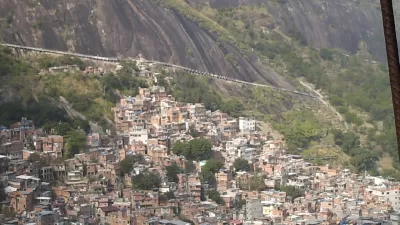Following the surge of “pacifying” missions in many of Rio de Janeiro’s famed favelas, Forbes’ Ricardo Geromel discusses the arrival of private sector investments and how they may evolve in the future.
Since the launch and installation of Pacifying Police Units in many of Rio de Janeiro’s largest favelas, businesses that once dismissed the neighborhoods as unstable danger-zones are now strategizing their entry into “untapped markets”.
And these markets, as Geromel writes, are no small matter. In addition to housing a population larger than Portugal’s, a recent survey by Insituto Datapopular found that favelas generate approximately R$ 13 billion each year. With fears of insecurity quelled by the presence of the Pacifying Police Units (UPP in Portuguese), businesses are now rushing in.
Geromel cites the case of Ricardo Eletro, a national retailer that has invested more than R$1 million in a unit in Rocinha, the country’s biggest favela. In the same neighborhood, another national retailer, Casas Bahia, invested in a 1,400 square meter property. And, in another of Rio’s smaller favelas, multinational Banco Santander has opened its first branch.
New investments from private sector players, Geromel writes, could bring long-term improvements to social and economic conditions in the favelas. Geromel cites the case of TenSports Marketing and the Indoor Soccer Federation of Rio de Janeiro, who have recently partnered to sponsor a soccer tournament between several of the city’s favelas. As part of the project, called the “Pacified Rio Cup,” the companies are investing in the construction and renovations of local soccer fields and recruiting local residents to work on-site.
In addition to new sports facilities and temporary employment opportunities, Geromel sees the potential for new sponsorships and marketing initiatives that would bring more money into these low-income neighborhoods. “…thanks to ‘Pacified Rio Cup,’” Geromel writes, “I imagine companies paying large sums and building amazing soccer fields in the favelas in exchange for publicity.”
Geromel aligns his hope for change with those of Rio’s mayor, Edouardo Paes who, in a recent TED talk, proclaimed that “Favelas are not always a problem. Favelas can sometimes really be a solution.”
FULL STORY: Eduardo Paes, Rio de Janeiro's Mayor, Reveals Where The Money Is Heading To In Brazil: Favelas

Planetizen Federal Action Tracker
A weekly monitor of how Trump’s orders and actions are impacting planners and planning in America.

Restaurant Patios Were a Pandemic Win — Why Were They so Hard to Keep?
Social distancing requirements and changes in travel patterns prompted cities to pilot new uses for street and sidewalk space. Then it got complicated.

Map: Where Senate Republicans Want to Sell Your Public Lands
For public land advocates, the Senate Republicans’ proposal to sell millions of acres of public land in the West is “the biggest fight of their careers.”

Maui's Vacation Rental Debate Turns Ugly
Verbal attacks, misinformation campaigns and fistfights plague a high-stakes debate to convert thousands of vacation rentals into long-term housing.

San Francisco Suspends Traffic Calming Amidst Record Deaths
Citing “a challenging fiscal landscape,” the city will cease the program on the heels of 42 traffic deaths, including 24 pedestrians.

California Homeless Arrests, Citations Spike After Ruling
An investigation reveals that anti-homeless actions increased up to 500% after Grants Pass v. Johnson — even in cities claiming no policy change.
Urban Design for Planners 1: Software Tools
This six-course series explores essential urban design concepts using open source software and equips planners with the tools they need to participate fully in the urban design process.
Planning for Universal Design
Learn the tools for implementing Universal Design in planning regulations.
Heyer Gruel & Associates PA
JM Goldson LLC
Custer County Colorado
City of Camden Redevelopment Agency
City of Astoria
Transportation Research & Education Center (TREC) at Portland State University
Camden Redevelopment Agency
City of Claremont
Municipality of Princeton (NJ)



























